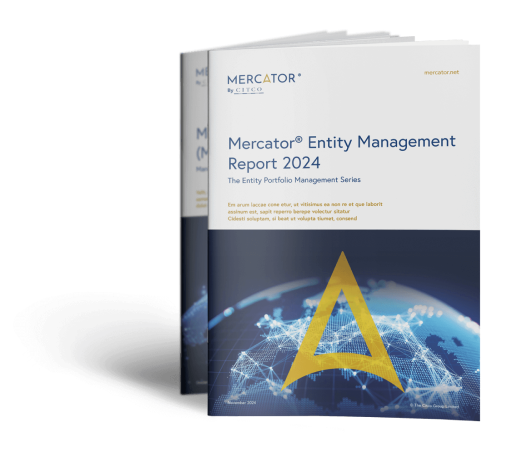The information contained in this document is marketing material and for informational purposes only. The information contained in this document is presented without any warranty or representation as to its accuracy or completeness and all implied representations or warranties of any kind are hereby disclaimed. Recipients of this document, whether clients or otherwise, should not act or refrain from acting on the basis of any information included in this document without seeking appropriate professional advice. The provision of the information contained in this document does not establish any express or implied duty or obligation between Citco and any recipient and neither Citco nor any of its shareholders, members, directors, principals or personnel shall be responsible or liable for results arising from the use or reliance of the information contained in this document including, without limitation, any loss (whether direct, indirect, in contract, tort or otherwise) arising from any decision made or action taken by any party in reliance upon the information contained in this document. © The Citco Group Limited, December 2024.
Navigating Entity Management in the UAE
Strategically located between Europe, Africa and Asia, the United Arab Emirates (UAE) continues to a be an important financial hub for many international businesses.
However, in comparison to other global financial centres, the regulatory environment can be a difficult to navigate. There are a multitude of corporate requirements to comply with and differing authorities in each free zone and state, each with their own processes and deadlines. This makes daily operations more challenging and contributes to the jurisdiction ranking as one the most expensive locations for multinationals*.
Over the last few years, the government has been working to simplify regulatory procedures, reduce paperwork and improve efficiency and transparency of government services – with the aim to make it easier to do business within the seven emirates states and 46 free zones making up the UAE.
Digitalization Drive
In March 2021, the UAE Government launched the Digital Customer and Digital Government Service Policy as part of its Strategy for Government Services, which aims to increase the delivery of proactive digital services as well as improve the user experience with digital government services. It also enables integration and interconnection of the digital platforms used by federal government entities.
Moreover, the UAE Government adopted blockchain technology through the Emirates Blockchain Strategy 2021 and Dubai Blockchain Strategy as part of government efforts to integrate the latest technologies and innovation practices. The blockchain technology improves governmental operations and its efficiency, increasing economic growth and innovation across various sectors.
Another key driver of digitalization is the implementation of the digital platforms “Tasheel” and “eServices” for registration and licensing of business in the UAE in order to streamline the process and reduce risk of non-compliance with legal requirements. Additionally, businesses can complete their renewal procedures digitally, saving time for both companies and government entities. These digitalization strategies significantly contribute towards efficient corporate entity management in the UAE.
Furthermore, many corporations now utilize electronic document management systems (EDMS) to securely store, organize, and retrieve all business documents. This allows for easier access to information within the organization while reducing physical storage requirements.
Although the UAE government has made efforts to enhance digital infrastructure, the intricate process of legalization could be significantly streamlined and simplified by adopting apostilles. Currently, reliance on Ministry of Foreign Affairs (MOFA) attestations prolongs and complicates the process as UAE is not a part of the Hague Convention abolishing the requirement of legalization for foreign public documents.
Risk of Non-Compliance
The UAE government applies strict compliance standards. Every establishment must follow mandatory corporate compliance requirements, which are an essential aspect of doing business in the UAE.
Compliance with legal requirements and statutory obligations such as filing annual accounts, disclosing Ultimate Beneficial Owners, and complying with Economic Substance Regulations, ensures that businesses operate in a transparent and accountable manner, protects the interests of stakeholders and helps prevent fraud, corruption, and money laundering.
Non-compliance with the obligatory corporate requirements can result in straightforward penalties such as fines, incarceration, and the loss of business licenses and permits. The sanctions vary based on the type and severity of violation.
Key considerations for Entity Management in the UAE
1. Differing local regulations and requirements
Each emirate state and free zone has different rules and regulations, making them jurisdiction specific. It is crucial to know the specific requirements and legislation set out by the local authorities. This ensures that businesses operate within the legal framework(s) applicable to their location, reducing the risk of fines and legal issues.
2. Timely compliance
Timely compliance guarantees that businesses meet all legal requirements within set deadlines, including the preparation and submission of required documentation and reports. This helps to avoid penalties and potential disruptions to daily operations. Additionally, meeting legal deadlines help organizations maintain their good legal standing with the authorities.
3. Maintenance of corporate records
It is essential to keep corporate records and mandatory registers accurate and transparent in order to ensure compliance and avoid disputes with the numerous regulatory authorities.
Depending on where the registered business is located, certain regulations set a deadline for updating necessary registers with the regulatory authority. This helps to ensure the maintenance of accurate records and to comply with statutory obligations related with corporate governance and financial reporting.
Gintarė Jonaitytė
Senior Legal Officer, Mercator by Citco, Citco Mercator, UAB
Regulatory Updates
In December 2022, the United Arab Emirates (UAE) government announced its first-ever corporate tax regime, introducing a corporate tax rate of 9%. This new corporate tax regime is now in effect for businesses with fiscal year starting on or after 1st of June 2023 and applies consistently across all Emirates States.
Read about the UAE’s New Corporate Tax regime here.

